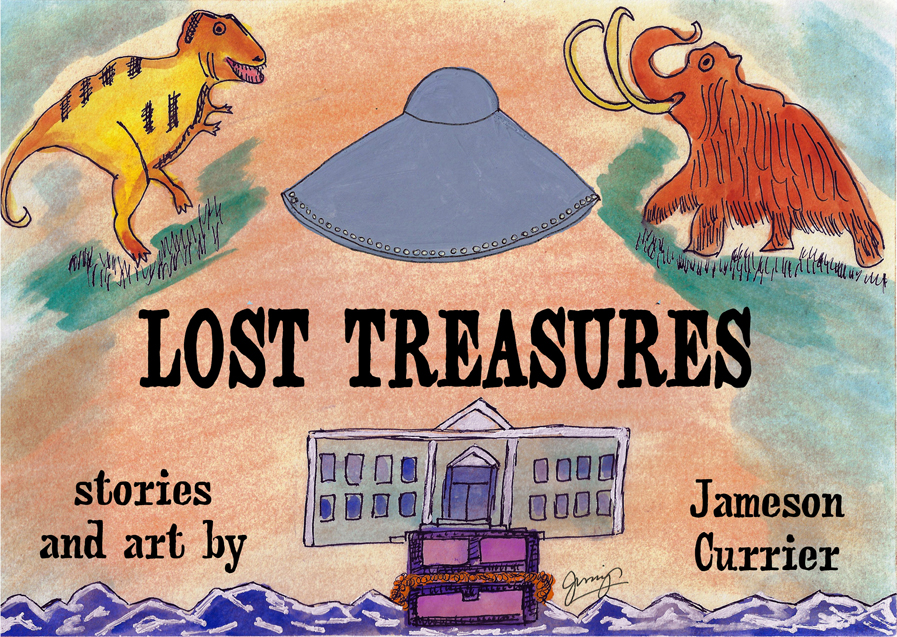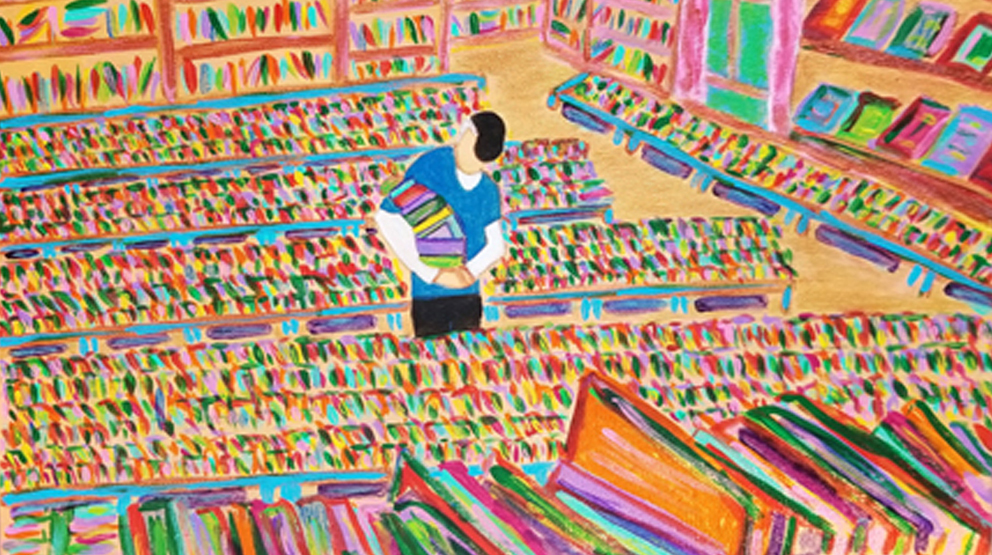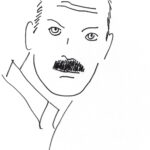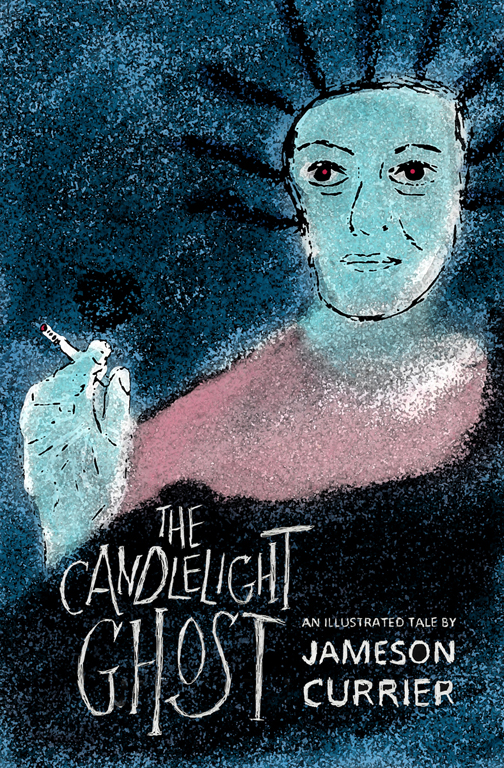
“When I Was Young I Used to Dream in Lavender: The Writer”
art by Jameson Currier
Ink, watercolor and pastel on paper
20170410002
PASSING GRADES
by Jameson Currier
In the study of astronomy some theorists believe that the dominant movement of astronomical objects is away from one another, a result of the expansion of space that followed from the universe’s explosive origin in the Big Bang. However, some scientists suggest another theory, a belief that the universe is highly organized on large scales and that galaxies and other masses, instead of being randomly scattered about, seem to fall in clumps and filaments, separated by empty voids, yet traveling through space at a high velocity towards some unknown mass.
The young man knows that there is no belief that planets can revolve around other planets in equilibrant paths, that there must be a center, some gravitational pull to which all other bodies orbit. But the young man does think that it might be possible for two planets, each with different orbits, to pass so close to one another that one planet can exert enough gravity to pull the other planet into its orbit as they both succumb to an orbit around a larger body, traveling swiftly through the mysteries of the universe.
The young man is thinking about these planetary orbits when he first meets the beautiful young blonde woman. It is a cold, wintry day and he is wearing jeans and a sleeveless down jacket over a sweatshirt. He has just climbed up four flights of stairs of the college dormitory to visit his friend Debbie. The young man has knocked at the door of Debbie’s room and has been greeted by this beautiful young blonde woman who, at this very moment, io wearing a bikini.
“You must be Debbie’s friend,” the beautiful young blonde woman says to the young man. “She’s not back from the library. She said if you got here first to come in and wait.”
The beautiful young blonde woman does not explain why she is dressed in a bikini. In fact, when the young man enters the room and sits on a chair beside a desk, he thinks the room is rather chilly. The young blonde woman goes to a corner of the room near a closet and slips the bikini off, not even considering the fact that the young man might be watching the fabric drop to the floor. The young woman begins searching through a dresser drawer and pulls out another bikini and slips it on. She walks over to the mirror and looks at herself.
“I always wanted to look like one of those French models. Paper thin, you know. But I was blessed with these breasts,” she says to the image of herself in the mirror. “And since I do have them, I might as well take advantage of them,” she adds and turns to the young man.
The young man catches a scent of her perfume and lifts his hand to his face to stop a sneeze, but his reflexes are too slow.
“When you know too much, you sneeze,” the young blonde woman says.
The young man thinks a moment about what she has said. Yes, he does know a lot. He knows a lot about the beautiful young blonde woman. He now even knows what she looks like in and out of a bikini. The young man has only been in college for three months and in that time has heard many stories about the beautiful young blonde woman from the young woman he is waiting for, her roommate Debbie. In fact, he has heard so much about this beautiful young blonde woman that he wonders if she knows just as much about him as he does about her.
This time, this first time he has met the young blonde woman in the room with the chill, the bikini, and the sneeze, is not the first time he has seen the woman. The first time he ever saw this young woman was during the first week of school when she was standing in front of the dormitory and a handsome young man wearing a sweatshirt with Greek letters was unloading a car. The young woman was holding a large instrument covered with a dark fabric case and which was as tall as she was, though shaped absolutely differently. “She won’t let anyone touch that bass,” her roommate Debbie had told the young man several weeks later. “Guys come and go and bring her presents and everything. She lets them carry her books and even go grocery shopping for her. But none of them are allowed to touch that bass. She even has a name for it, ‘Harvey.’”
“This one is Gregory,” the young blonde woman holds a striped bikini in her hands. “This one is Ben,” she pulls out another, this one pink. “And this one is Sam. Sam was gorgeous and he was in Malibu. I haven’t had to buy a bathing suit in six years.”
The young man knows that this beautiful young blonde woman has names for almost all of her possessions. Although he has never been in this room before he knows the names of many of the objects that are displayed in this room. His friend Debbie has told him stories about all of them, about how they came to be a part of this young woman’s life. Harvey, the woman’s string bass, leans against a corner near the closet. Like the rest of this young woman’s accumulated belongings, the string bass bears the name of a former romance, most of which were musicians since the young woman is studying music. The objects were not named to recall the actual person, the young woman’s roommate had told the young man, but to remind the young woman about her explorations into love, to remind her not to let her heart be broken again. “It doesn’t work,” the roommate had said.
Harvey, the string bass, is named for an old childhood friend from Boston, Harvey Weathersby, a violinist with whom the young woman would spend more hours practicing concertos than affection. Louie is the name of her notorious oversized scarf, a motley-hued rainbow of clashing colors, which had been a gift from a trumpet player during the young woman’s brief stint with a Dixieland combo in Maine; her pocketbook, a patchwork contrivance of carpet squares, she calls Johnny because her high school marching band flame, a trombone player, would leave notes to his sweetheart pinned to the fabric.
There are also the young woman’s coat, Arthur; her ski cap, Tony; her gloves, Gregory; her suitcase, Calvin; and even her shoes, Kenny. The young woman’s name is Ann, though everyone, including her roommate, calls her Lan. “Land Ann,” the young woman had explained to her roommate. “Cause I’m afraid of water.”
The young man shifts his weight on the bed where he is seated and looks at the toy stuffed monkey that sits next to him. Even the monkey has a name. “Woojie,” he remembers the young woman’s roommate telling him. “She loves him.” The young man picks up the stuffed toy and rubs his hands across the fuzzy acrylic stomach and then studies the smiling felt face. The young man does not know the story of how the stuffed monkey got his name, or for whom he is named, but he sits quietly on the bed and hopes someday that he will learn.
“Are you helping Debbie study for chemistry?” the young woman says after she has tried on the bikini from Sam and has seated herself on the bed, next to the young man.
“Biology,” the young man answers.
“Peter is coming over later to help me with an Epistemology paper,” the young woman says. “But I can’t decide whether to go to Florida with him during the break or with Steve from Chinese History. So far neither of them have bought me anything.”
The young woman lifts the stuffed toy monkey from the young man’s embrace and walks to the mirror. The young man thinks it odd, the wintry setting outside the window, the chill inside, the stuffed monkey covered with a fuzzy fur, the woman wearing only a bikini named Sam, and his own snug, comfortable feeling.
In the reflection of the mirror the young man can see Harvey, the string bass, leaning in a corner of the room, “We look good together,” the young woman says looking at herself in the mirror and the reflection of the young man on the bed.
The young man does not know if she means himself or her stuffed companion, or maybe the musical instrument in the corner.
“You know what they should teach at this college?” the young woman says with a sigh. “A course on love.”
The young man hopes he will remember this moment, the image of a beautiful young blonde woman suspended in front of a mirror, the feeling of warmth which radiates from possessions of love, and the knowledge that there is still more to learn about what love actually is.
* * *
History is the study of past events, usually in chronological order, of what happened in the life and development of a people, country, institution, or civilization.
The method for studying history, is commonly to take these chronological events and place them in periods of time such as eras. In reading about eras, textbooks are usually separated into chapters. In this way, it is possible for a student to look at the past in an uncomplicated way. Nothing tends to overlap from one chapter to another.
If he were to divide his life thus far into chapters, the young man would not begin a new chapter at the moment he entered college. He would begin it with the moment that he met his first college friend, a chubby, but pretty girl named Debbie.
The young man is now a year older than when he first met Debbie’s roommate, the beautiful young blonde woman. He is sitting near a radiator in a large rehearsal room. It is as cold today as it was a year ago. The young man is seated on a piano bench and he is playing the piano. His friend Debbie is leaning against a piano and she is singing the words to the song that the young man is playing. It is an old torch song, the type that has words about how a man has loved a woman and then left her to love another. If Debbie did not have a beautiful voice the young man would still think that she is singing this song very special today.
The reason why the young man and his friend are playing and singing is that they are taking a break from studying. Debbie has an exam tomorrow in Microeconomic Theory. Although she wants to be a singer and is majoring in music, Debbie is taking as many business courses she can struggle through. “For protection,” she explains. The young man is writing a paper on T.S. Eliot’s use of the quest of the Holy Grail in “The Waste Land” which is due in his Modern Literature course tomorrow. The young man has not decided what his major is; he figures he still has another year to make up his mind.
The young man is happy that they are together in this rehearsal room, playing and singing music. It has been difficult for him to talk to Debbie the last few weeks, and he is thankful that the music they are making is a way of communicating their feelings without words.
Besides being chubby, the young man’s friend has a light pink complexion with soft freckles and reddish hair. Although she doesn’t consider herself pretty, her friends do. She has a very pretty face but is always worried about her weight. But her friends don’t notice her weight, because Debbie has such a wonderful, cheerful personality. She is always surrounded by friends. It is through Debbie that the young man has met his friends at college. It is how he met Debbie’s roommate, the beautiful young blonde woman named Lan, as well as his own roommate Mike. Last year in the spring, all four of them took the same music course, though only Debbie and Lan are majoring in music.
Before they began singing and playing music in the rehearsal room, on the walk across campus from the library, Debbie had confided her thoughts to the young man. The young man is glad that Debbie confides in him, she does not do this with all of her friends, for fear of destroying what her friends like most, her cheerful image, and, the young man is glad to have a special place in his friend’s life. “I thought it would have been so much easier, Debbie had said to the young man on their walk. ‘‘It was such a clearly defined relationship. I knew I was third or fourth on the list, after the wife, the kids, and the career.”
The young man knew his chubby friend was referring to her music professor, an attractive man in his forties with whom she had been having an affair.
“Married men don’t take you for granted. You don’t have to be beautiful every moment. The conversation is great and the sex is wonderful. You’re there to satisfy. And you don’t have to wait and wonder if he’s ever going to call you again, because he does. I didn’t think I would fall in love.”
The young man wished he could offer advice, but he could not. In his short life he himself had made a few mistakes in the lessons of love. He remained silent, listening and nodding, as his friend explained that she was ending the affair because she was feeling the guilt that she expected the married man to feel.
“If I had a choice, I would rather be loved than love,” Debbie had ended the conversation when they walked into the rehearsal room.
As his chubby friend begins to sing the last refrain of the love song, the young man looks up and notices that she is crying. He looks down at the keys of the piano and wants to say something that will dispel his friend’s tears, but he cannot find the right words to accompany his own feelings, so he continues to play the piano. The young man knows that his friend is not crying over the married professor. She is crying about something she has not yet spoken or sung about, the death of her father.
Last week her father died and Debbie has only been back at school a few days since his funeral. She has been so busy catching up with her classwork and breaking off her affair, that she has not talked to anyone about her father. But the young man remembers that she once told him that her father always loved to hear her sing. The young man knows that this is the first time she has tried to sing since she returned to her friends.
The young man hopes he will remember this moment, the image of a young woman that sings with her heart, the feeling of loss when love stops, and the knowledge that love can hurt as much as death.
* * *
Architecture is the art of building. Before designing a building, an architect first examines the surrounding environment, sketching and surveying the area so that the new space he will create will not only have permanence and purpose, but will become the architect’s own unique statement. Yet before construction can begin, the earth must first be tested to see if it can sustain the architect’s vision and statement.
The young man and his roommate have shared a dormitory room for the last two years. It has been one year since the young man’s roommate has made his statement. It is within this year that a lot has happened to the roommate. Since the time the roommate has made the statement known to his parents, his parents have announced a statement of their own, that they were being divorced. The roommate has also contemplated dropping out of college, as if his statement was itself reason enough not to continue studying. But the roommate has not dropped out of school, although he has stopped studying. The young man knows that his roommate will not pass Comparative Psychology, unless the young man offers to write a paper on the evolution of behavior for the roommate. In the year between the roommate’s statement and his parent’s announcement, and scattered in between the dropping grades, the young man’s roommate has been searching for love. The young man thinks it is not that his roommate has never found love, it is just that he has only so far discovered little bits and pieces of it.
This evening, the young man has agreed to go out with his roommate, not because he himself needs the companionship, but to offer his roommate companionship if it is needed. They have driven into the city, away from the school and attempts at passing grades. At first, when the young man entered this very large room with his roommate, he was embarrassed. He wasn’t embarrassed at being with his roommate, or being in this very large room; he was embarrassed at watching, and the possibility of himself being watched.
“I see someone I want to know,” the roommate says to the young man after only a moment at the young man’s side.
The young man watches his roommate disappear into the crowd of the very large room. Left alone with his embarrassment the young man fidgets a bit where he is standing, then walks across this very large room to a corner and orders a drink from a man that stands behind a counter.
The young man stands near the counter and after a few sips of his drink he becomes relaxed. Beside him there are other men sipping at drinks and watching the other people in this large room and this, too, makes the young man feel even more comfortable. The corner of this large room in which the young man is standing is lit only by lights that shoot down from the ceiling in spots or which rotate in circular fashion. The young man cannot hear what the other people in this room are saying or whispering to each other because there is music playing, rather loudly from speakers suspended from the ceiling near to where the lights twirl and shoot to the floor. In this dim, flashing, swirling light and the throbbing music, the young man notices that his roommate, Mike, is dancing near the center of the room. Mike is dancing very energetically, as if by his dancing, he is releasing his frustrations over his parents, school, and passing grades. But his roommate a dancing for other reasons as well. He is dancing to prove his statement. The young man’s roommate is dancing with a man he met only a few moments ago.
It is not disturbing for the young man to watch his roommate dance with another man. What is disturbing is the presence of so many dancing men, dancing not with women, but with each other. For a moment he is comforted by the sight of a woman on the dance floor, but when the woman dances into one of the spots of light which shoot from the ceiling to the floor, the young man realizes it is not a young woman at all, but a young man dressed as a young woman. The young man wonders about the young man dressed as a young woman. Is he too making a statement? Is he too seeking escape from passing grades, a family that doesn’t understand, a society that shuns and mocks him? The young man notices that the young man dressed as a woman dances with the same energy as his roommate and the young man notes that they both, simultaneously, lift their arms toward the ceiling, perhaps hoping to catch a ray of light, a note of music, or one of the little bits of love which is flying about this very large room.
The young man hopes he will remember this moment, the image of a crowd of bodies connected by dancing, the feeling that embarrassment and frustration can be released through motion, and the knowledge that even though love seems intangible, there is still the hope it can be caught like a ray of flashing light.
* * *
Archaeology is the study of the life and culture of ancient civilizations through the excavation of artifacts, relics, and sometimes entire cities which have been buried in the ground for many years. Archaeologists use these artifacts to reconstruct the cultural history of past civilizations. The archaeologist has to concentrate on the material available to him, and must sometimes speculate about the artifacts as he reconstructs the life and habits of a group of people.
It has been three years since the young man first met the beautiful young blonde woman, and in that time the young woman has loved many times. The young man is again in the young woman’s room, a room he has always felt littered with too many remembrances of love. It is not cold in the room today like it was when they first met. It is warm and sunny and the window is open to allow the first scent of spring to float about the room.
“I want to surprise Debbie,” the young woman says while moving about the room.
The young man does not answer but takes a pile of clothes the young woman has handed him and folds them neatly and places them in a large cardboard box.
“That gets rid of Paul, Greg, Peter, Robert, and Richard,” the young woman says with a smile.
After a while there are several boxes filled with clothes, objects, and souvenirs which the young woman no longer wishes to keep. The young man looks about the room, which now looks quite spare except for the boxes filled with mementos of love piled one on top of each other.
“This will save a lot of emotion,” the young woman says when they have almost finished packing the last box.
The young man does not answer, but silently agrees. In a couple of months, they will be graduating. For the young woman, this means there will be less to pack, less events to remember. It’s better to do it now the young man knows, before it hurts to pack up the memories, but for himself he has no desire to forget or box up the artifacts of his life.
He wants to linger as long as possible with his friends and his memories before another year passes, before time is allowed to slide them all a little further away from one another.
“I don’t need all this to remember,” the young woman says and pushes a pile of clothes into the box, hoping to make space for more objects.
The young man takes the toy stuffed monkey from the bed and places it in the box atop the pile of squashed clothes.
“No,” the young woman says and takes the toy monkey out of the box. “I can’t give him away. Everyone should have a Woojie.”
The young man stops for a moment and sits on the corner of the bed, watching the young woman holding the toy stuffed monkey.
“A woojie is something special that two people share,” the young woman had explained to the young man one evening a year ago. “Sort of like a good time or a memory. But it has no other purpose except to remind you of the person of who you were with or where you got it. You can’t wear it. You can’t play it.”
“Then it can’t be bought,” the young man remembered replying. “And it can’t be a gift,” the young woman further defined. “It has to be obtained without purpose or plan. I won this at a fair, just before I started college. I remember the guy I was with when I won it, but it doesn’t just remind me of him. It reminds me of the good time I had, the moment of the laugh, and that there was someone there to share it.”
The young woman places the toy stuffed monkey on the bed and begins to tape up the seams of the last box. The young man remains seated on the bed, looking at the toy named Woojie, trying to remember the story of how the monkey got his name, but instead only remembering what the name meant.
“The name is unimportant,” the young woman had remarked. “It’s the feeling. That’s what has to be named and remembered.”
The young man hopes he remembers this moment, the image of memories packed away, the feeling that sweeping and cleaning cannot erase what lingers in the mind, and the knowledge that when someone unpacks a box, it will mean nothing unless the feeling is inside.
* * *
Language is the expression or communication of thoughts and feelings by means of vocal sounds, to which meaning is attributed. Dialect refers to a form of language that is peculiar to a locality or group and differs from the standard language in matters of pronunciation and syntax and sometimes meaning.
The young man is sitting in a diner. With him are his roommate, Mike, his friend, Debbie, and the beautiful young woman, Lan. They are not the only people in this diner. There is a cook leaning over a stainless-steel grill busily preparing the day’s specials and two middle-aged waitresses who sport highly teased hairdos and have their names embroidered on the lapels of their uniforms. The cook and the two waitresses know the names of the young man and his friends. They come here regularly on Sunday mornings.
“Seven,” the young man’s roommate Mike says before he drinks a glass of orange juice. “He’s not blond.”
“Eight,” Debbie says and pours syrup atop her pancakes.
“Seven,” Lan agrees before taking a bite of the hamburger she has ordered even though it is still morning. “Unless he’s rich, then he’s a nine,” she adds after a swig of cola.
The young man silently listens to his friends talking. They are not talking about the cook or his two middle-aged waitresses. Their conversation concerns a man who has entered the diner and is seated alone in a booth near the window. The numbers which his friends have pronounced are grades which rate the man’s physical attractiveness.
This is not the first time his friends have used such numbers to define the attractiveness of other people. The young man tries to remember when this grading first started. He thinks it began one summer at the beach, a summer three years ago when they were all still in college but away from the books for the summer. The young man would sit on the beach with his friends and watch the men and women that passed by their arrangement of beach towels. It began as a simple game to pass away the idle time. The men and women strolling by were rated on a scale from one to ten, much like Olympic contestants, with ten being the perfect score. The ratings that summer were grades of physical beauty, and the young man remembers each of them sighing when they had graded a ten, though he cannot remember the person which was graded. And this game did pass away the idle time on the beach, but the game itself did not. It entered another dimension. It became a secret language the four friends shared, a way of expressing not only the physical beauty they admired, but incorporating the qualities they desired of their companions, partners, friends, and potential lovers.
It has been nine months since the young man and his friends have graduated college. Since they have graduated college, the beautiful young woman named Lan has played once in a symphony orchestra, filling in for someone who was ill, and she supports herself as a typist, waiting for the day when another musician will become sick or someone will want to hire a beautiful young blonde woman that plays a string bass. She now shares an apartment with her former college roommate Debbie, the young man’s friend, who sometimes sings in a nightclub in the city on Thursday nights but works as a teller in a bank downtown. The young man’s roommate, Mike, is still his roommate; they share an apartment in the same building as the young woman and her roommate. The young man’s roommate works as an assistant at an art museum but is studying computer programming two nights a week. The young man has had several jobs since he graduated from college. He has been a shoe salesman, a substitute teacher, a waiter, and is currently a proofreader at a law firm.
The young man and his friends have come to this diner every Sunday morning since they have graduated from college. They spend Sunday mornings together to catch up on what has happened to one another during the previous week, and offer each other advice or support. For some of them, these Sunday morning meetings allow the opportunity, if necessary, to escape their Saturday night date. For some, it means something to look forward to. For all, it offers security, to know that in a world where things are changing that something remains constant, their friendship. No one ever cancels. No one else is ever invited.
“I’ve gone as low as a five,” the beautiful young blonde woman named Lan says. “But the guy was real together. He bought me a new winter coat that had a mink collar. That made him at least an eight.”
The young man looks across the diner at the man who is the object of discussion. The man is now sipping a cup of coffee, the steam rising toward his face and disappearing before it reaches the ceiling, He seems to be slightly older than the young man and his friends. Perhaps it is because the man sits in silence. The young man imagines that if he were to take a photograph of this man and his silence and then study the photograph closely, he would find something that lies behind the image, something beneath the attractive exterior. The photograph would show him not only the physical beauty but the other qualities as well.
The waitress hovers about their table, clearing the plates and cups and silverware. She too knows the dialect these friends speak. “I give the dreamboat an 8.5. You should get a look at his baby blues.”
It is then that the young man realizes a photograph would be a mistake. The image itself would not be true. A photograph can also capture mistakes. Language is the key to discerning the other qualities.
The young man hopes he will remember this moment, the image of an attractive person, the feeling of wishing there is even more inside, and the knowledge that to find the qualities inside, a language must be developed that allows them to communicate.
* * *
Music is the combination of sounds and tones into melody, harmony, rhythm, and timbre. This combination can cause a response from both the senses and the mind, and thus the response itself becomes a combination of emotional and intellectual elements.
The young man is lying motionless on his stomach atop a carpeted floor, his arms and legs outstretched as far as possible.
“I’ve a feeling I’ve been here before,” the young man hears his friend Debbie moan and twist her feet into the starched sheets as she reclines atop a rock-hard mattress.
“We’ve never stayed here before,” the beautiful young blonde woman named Lan says and the young man hears her place Harvey, her string bass, into an unoccupied corner of the closet.
“Who would want to stay here?” the young man hears his roommate Mike sigh and sit in the plastic chair near the window. “A room with purple daisy wallpaper. With a green rug? And a black and white TV set? This decor is worse than Howard Johnson primitive. We are not spending a lot of time in this room. We only have a view of the parking lot.”
The young man is still lying on the floor. He listens between the words of his friends hoping to hear the sound of the waves of the ocean. It is warm on the carpeted floor and. for a moment the young man imagines that he is lying on the beach, the sea crashing against the sand, the sun pounding on his back, and his friends talking to each other as they linger about their beach towels.
It is six years since the chilly day that he first met the beautiful young blond woman. It is two years since they have graduated college. The young man thinks it is music that has carried them together this far. It is music which introduced them to each other six years ago when college began. It is music that has built for them memories of being together. It is music that has offered them a foundation for remaining friends after school has ended. It is music that has led them to this familiar yet unfamiliar motel room where the young man lies motionless on the carpeted floor.
Today is the first day of a week which the young man and his friends will spend together. They have traveled eleven hours from their city to spend a week at this motel room in which they do not intend to spend a lot of time. Instead, during the days they will spend time together at the beach and in the evening, they will spend time together in a bar just near the boardwalk of this seaside resort. In this bar it will also be music that will hold them together. In this bar they will perform music. They will perform the music that they enjoy. And this music, the way they combine the elements of rhythm, harmony, and tones, they know that others will enjoy.
This is not the first time the four friends have traveled together away from their city apartments. This is not the first time they have traveled together to a motel room near a beach with a view of a parking lot. This is not the first time they have performed music together. It all began in college, and has continued these last two years. It began one winter when the snow never melted, but kept turning to ice, a winter that lingered in bundled coats and overweight books. It began as a way to ease the burden of their classes, to disappear from their family frustrations, to cast aside for a while their quest for love. And the music they began to play together carried them away from their winter blues. It also carried them into the sun when a professor heard them and called a friend who owned a bar near the boardwalk of a seaside resort.
They do not make a lot of money from performing music in this bar. They will make just enough to stay in the motel room with a view of the parking lot. But what they will get from this week cannot be valued in monetary terms. What they will get is the chance of the sun, the opportunity to display their collective musical talents, and the hope that by doing this, they will be carried to something or somewhere or someone new.
“I heard there’s a new place that just opened on the pier,” Mike says to no one in particular, but to all. “We can check it out tonight after the show.”
“I hope I can find a lifeguard to teach me how to swim,” Lan says.
“I want to try this new lightener,” Debbie says. “Maybe it will help my hair.”
The young man hopes he will remember this moment, the image of music created from familiar sounds and voices, the feeling that exploration can keep friendship in motion, and the knowledge that even hope can leave you motionless on a warm carpeted floor.
* * *
Psychology is the science that deals with the mind, the mental and emotional processes of behavior. According to one school of psychology, learning is a result of stimulus and response, a process which shapes the actions, traits, attitudes, thoughts, and mental states of a person.
The young man is now seven years older than when he first met the young blonde woman, which does not make either of them an old man or an old woman, for chronologically they are still very young. But both are a bit wiser than when they first met. They are not wiser because of the knowledge they learned in college, but perhaps yes, they are more intelligent.
The young man thinks that maybe one of the reasons why they might be wiser now seven years later, is because they are no different than they were seven years earlier. They are only wiser because they have known each other.
It is not this wisdom that makes the young man feel so peculiar today. In fact, the young man cannot understand why he is feeling so strange. The young man and the young woman are walking in a shopping mall. They walk to a fountain where their friends, Debbie and Mike, are sitting nearby on a bench. The young man and the young woman sit beside their friends, so that all four are seated in a row. Around them the shopping mall is crowded; people whiz by carrying packages and bags. The young man thinks that maybe what makes him feel so different this particular day are the stares of other people: the shoppers. He thinks it odd that he has never noticed them before, never noticed how they look at himself and his friends.
From their positions on the bench, the young man’s three friends are admiring a handsome blond man who stands outside one of the shops within their vision. The young man imagines what the handsome blond man might think if he were to turn around and look at him and his friends.
Lan would be a beautiful young blonde woman; Mike would be a handsome dark-haired young man; Debbie would be a pretty, though plump, young woman. How would he be seen or would he be noticed at all?
“Give me one with money,” Lan says to Debbie.
“If he sent me a dozen roses, I’d marry him,” Debbie replies.
“He has blond eyelashes,” Mike sighs. “Long curly ones.”
A young woman dressed in a blue airline stewardess’ outfit rushes out of the shop, hugs the handsome young blond man, and slips her hand into his. Lan says she thinks the girl has too much eye shadow on and Debbie says her straw-colored hair seems as if it were cut and pasted into a swirl. Mike notes that the girl looks too tan and wind-blown. They all become silent as the young woman and the handsome blond man disappear in the crowd of shoppers.
After a while, the young man and his friends leave their bench and begin to walk through the shops again. In a department store they stop when a tall, thin woman squirts Lan and Debbie with a sample of an expensive perfume. A few steps beyond, they stop again, touching a set of glass counters which display diamond necklaces, ivory earrings, strands of pearls and turquoise bracelets. Mike disappears to the men’s clothing. Debbie slips away to look at shoes. Lan decides to try on a pair of diamond earrings. The young man watches a moment then slips across the aisle to a counter of stuffed toys.
“They’re beautiful,” the young man can hear the salesman remarking to Lan as she slips the last earring into place.
The young man turns away from the stuffed toys and watches Lan scoop her blonde hair in her hands and twist it to the top of her head, as though she were ready to attach a tiara. She studies her face in the mirror that rests on the counter.
“Breathtaking,” the salesman mutters and claps his hands together in delight.
The young man knows that Lan cannot afford the diamond earrings.
He knows the salesman does not expect Lan to buy them. He knows that Lan’s questions to the salesman about diamond etiquette are going to waste as she pretends to quiz the salesman about cut, color, clarity, and carat. But the young man does sense that the salesman wants to see the diamonds displayed on a lovely young woman, to appreciate beauty matched to beauty, not misplaced on lobes next to starched gray hair, not fondled by freckled old hands jutting out of mink sleeves.
The young man notices the wind-blown stewardess and her handsome companion are looking in a counter near Lan.
“Thou art fairer than the evening air, clad in the beauty of a thousand stars,” Lan recites as she returns the diamonds to the salesman. She still looks at herself in the mirror. From where the young man is standing, he can see her still in the mirror. He can see himself in the mirror, a tiny little reflection surrounded by stuffed toys. It is at this moment that the young man recognizes his peculiar feeling and with its recognition it disappears. The young man thinks at this very moment he is like one of the stuffed toys, arms outstretched, silently watching, waiting.
The young man looks beyond the mirror to the handsome man who stands beside the wind-blown stewardess. The handsome man turns away from the counter and looks in the young man’s direction. Their eyes meet for an instant. The young man looks away, observing his friends at their counters of jewels, shoes, and clothing, then returns his vision to the handsome man.
It seems strange to the young man that he never noticed the looks before. The handsome man smiles at the young man.
The young man hopes he remembers this moment, the image of someone looking, opening themself with an invitation. He hopes he remembers this feeling, that life is more than learning, that it is a path of decisions, and whatever the decisions are, the heart must sometimes follow behind. The young man hopes that the knowledge of this moment remains, that he is, at last, ready for someone to see him as himself. He is, at this moment, ready to fall in love.
__________
“Passing Grades” is an early, unpublished short story by Jameson Currier. It was written in 1982 at the age of twenty-six.
 “Lost Treasures” is Jameson Currier’s ongoing project to rediscover, revisit, and illustrate his early writings.
“Lost Treasures” is Jameson Currier’s ongoing project to rediscover, revisit, and illustrate his early writings.








